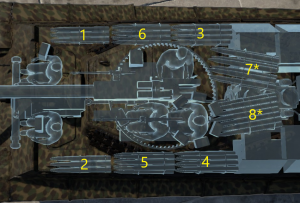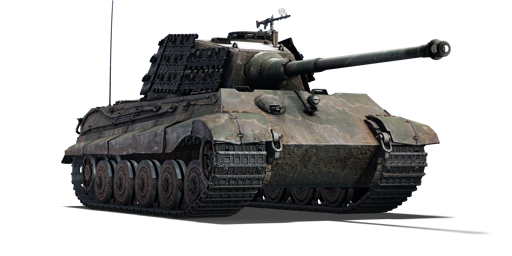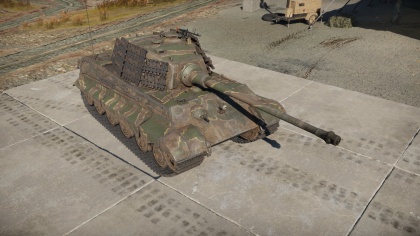Tiger II (H) Sla.16
Contents
Description
The Pz.Kpfw. VI Ausf. B (H) mit Simmering Sla.16 is a premium rank IV German heavy tank
with a battle rating of 7.0 (AB) and 6.7 (RB/SB). It was introduced in Update 1.57 "Battle March". As a purchasable bundle vehicle, this variant comes with premium bonuses and the experimental installation of a diesel power engine, increasing its mobility vastly. But the vehicle functions near identically to the in-tree regular variant. It fits into the 6.7 line-up very well and can be utilised greatly in battle because of it's enhanced combat capabilities.
General info
Survivability and armour
The frontal armour of the Tiger II is very strong and can only be penetrated by a select few tanks at its battle rating and even less when fighting in a down-tier. The side and back armour, however, are pitiful with only 100 mm at its thickest, some SPAA at the rank can penetrate the sides so it is advised to never show your back or sides to an enemy lest you want to go back to the hanger/garage. It is slightly more armored then its non-premium counterpart with added tracks on the sides on the turret, adding an extra 30mm of armor to the very weak sides.
Mobility
| Game Mode | Max Speed (km/h) | Weight (tons) | Engine power (horsepower) | Power-to-weight ratio (hp/ton) | |||
|---|---|---|---|---|---|---|---|
| Forward | Reverse | Stock | Upgraded | Stock | Upgraded | ||
| Arcade | 45 | 12 | 70 | 968 | 1,431 | 13.83 | 20.44 |
| Realistic | 42 | 12 | 663 | 750 | 9.47 | 10.71 | |
The top speed on-road forwards is around 42-44 km/h, and the reverse speed is surprisingly good at -11 km/h (RB). These speeds combined with neutral steering mean the Tiger II (H) Sla.16 is quite agile despite its heavy tank status. The engine has a lot of horsepower and climbing hills is surprisingly easy with this variant of the famed King Tiger.
Armaments
Main armament
The main gun this Panzer beholds is the KwK/43 88mm long-barreled gun. This gun performs astoundingly well for this BR, offering high muzzle velocity with more than enough post-penetration damage. The muzzle velocity of this gun sits at around 1000m/s for APCBC and 1400m/s for the APCR round, and also has HEAT shells, making it an exceptional sniper and brawler alike. The APCBC stock shell gets a fair amount of explosive filler with a wide one-shot capability upon penetration. This shell exceeds in ammo-racking enemy tanks, so aim for ammo stowage on the enemy vehicle. The APCR should only really be used for engagements on enemies you cannot punch through with APCBC alone, since it offers significantly higher penetration at the expense of post-pen damage, making it a very situational round. The same can be applied to the HEAT shell for long-range, as penetration dropoff does not matter on angled armour layouts, but instead offers poorer penetration values.
| 88 mm KwK 43 | |||||
|---|---|---|---|---|---|
| Capacity | Vertical guidance |
Horizontal guidance |
Stabilizer | ||
| 70 | -8°/+15° | ±180° | N/A | ||
| Turret rotation speed (°/s) | |||||
| Mode | Stock | Upgraded | Prior + Full crew | Prior + Expert qualif. | Prior + Ace qualif. |
| Arcade | 17.0 | 23.6 | 25.8 | 28.6 | 30.4 |
| Realistic | 12.5 | 14.7 | 16.1 | 17.9 | 19.0 |
| Reloading rate (seconds) | |||||
| Stock | Prior + Full crew | Prior + Expert qualif. | Prior + Ace qualif. | ||
| 9.7 | 8.6 | 7.9 | 7.5 | ||
Ammunition
| Penetration statistics | |||||||
|---|---|---|---|---|---|---|---|
| Ammunition | Type of warhead |
Penetration in mm @ 90° | |||||
| 10m | 100m | 500m | 1000m | 1500m | 2000m | ||
| PzGr 39/43 | APCBC | 237 | 234 | 222 | 207 | 194 | 181 |
| Sprgr.43 | HE | 14 | 14 | 14 | 14 | 14 | 14 |
| Hl.Gr 39 | HEAT | 110 | 110 | 110 | 110 | 110 | 110 |
| PzGr 40/43 | APCR | 279 | 273 | 252 | 227 | 205 | 185 |
| Shell details | ||||||||||
|---|---|---|---|---|---|---|---|---|---|---|
| Ammunition | Type of warhead |
Velocity in m/s |
Projectile Mass in kg |
Fuse delay
in m: |
Fuse sensitivity
in mm: |
Explosive Mass in g (TNT equivalent): |
Normalization At 30° from horizontal: |
Ricochet: | ||
| 0% | 50% | 100% | ||||||||
| PzGr 39/43 | APCBC | 1,000 | 10.16 | 1.2 | 14 | 108.8 | +4° | 48° | 63° | 71° |
| Sprgr.43 | HE | 820 | 9.4 | 0.1 | 0.5 | 1000 | +0° | 79° | 80° | 81° |
| Hl.Gr 39 | HEAT | 600 | 7.64 | 0.0 | 0.3 | 1100 | +0° | 62° | 69° | 73° |
| PzGr 40/43 | APCR | 1,130 | 7.3 | N/A | N/A | N/A | +1.5° | 66° | 70° | 72° |
Ammo racks

Thanks to the ready rack feature found on this tank, the first and second ammo racks found in the back of the turret will always be full of ammo, making it the prime target for enemy tankers who are looking to detonate your ammo rack. Even solid shots like APCR and APDS that commonly pierce your front turret can make their way to the rear of the turret, potentially hitting the ready racks and can cause a critical hit to become a deadly one.
| Full ammo |
1st rack empty |
2nd rack empty |
3rd rack empty |
4th rack empty |
5th rack empty |
6th rack empty |
7th rack empty |
8th rack empty |
Visual discrepancy |
|---|---|---|---|---|---|---|---|---|---|
| 70 | 65 (+17) | 59 (+28) | 48 (+39) | 37 (+50) | 30 (+57) | 23 (+64) | 12 (+70) | 1 (+76) | Yes |
Both side empty: 23 (+47)
Notes:
- Recommended ammo load is 23 to keep the hull empty and both ready racks full.
- 7th and 8th ammo racks are ready racks, and takes priority in being filled at the beginning of the battle, then fills 1 through 6 in that order.
- Full reload speed will be realized as long as ammo exists in either ready rack. If both ready racks are empty, a penalty to reload speed will occur.
- Simply not firing the main gun when it is loaded will load ammo from racks 1-6 into 8 then 7, as long as there is ammo in racks 1-6. Firing the main gun will interrupt the loading of the ready racks.
Machine guns
| 7.92 mm MG 34 | ||||||
|---|---|---|---|---|---|---|
| Coaxial mount | ||||||
| Capacity (Belt capacity) | Fire rate (shots/minute) |
Vertical guidance |
Horizontal guidance | |||
| 3,000 (150) | 900 | N/A | N/A | |||
This tank, unlike the standard version, receives an additional top mount MG34 7.62mm machine gun located atop the commander's cupola with a wide arc of fire, designed for anti-aircraft purposes. However, this extra gun proves inadequate at efficiently dealing damage to aircraft and so should be used more prominently as a spotting tool or a light armour remedy.
Usage in battles
Considering most of the players who use this vehicle will be using it in RB/SB, this section will cater to them. This vehicle can be used as a brawler and a sniper equally. With its potent gun and reliable armour layout, this tank can take a fair few shots before expiring. Try not to let your flanks become exposed if playing in urban maps. On open maps, you should stick to towns or hills and remain hull down to utilize your thick turret cheeks well. Aim for noticeable weak spots on enemies, ie. lower glacis shots or ammo rack shots will more often than not result in a reliable way to destroy them. The gun has a solid rate of fire, not too slow, so you can follow up with a return shot fairly quickly. You will adapt over time and learn where the weak spots of most opposing vehicles. At times, this tank will act more as a support tank when considering the typical opponents will more than likely have stabilizers and sufficient suspension dampening, putting you at a disadvantage if you can't train your gun onto the target first. American heavy tanks such as the T29, T34, T32 and M103 will sometimes give you trouble. The trick to dealing with these tough, heavily armoured foes is to aim for the lower glacis. When engaging these vehicles, if you are not confident in being able to penetrate on your first shot, try and shoot the gun barrel to prevent your foes from firing back at you.
Pros and cons
Pros:
- Armed with the fantastic KwK 43, arguably the best pound-for-pound gun in the game
- The default APHE shell has very high accuracy, shell velocity, penetration, and damage potential
- 22 shells in the first stage ammo rack, giving this tank an impressive rate of fire, especially when equipped with an Ace crew
- Astounding frontal armour, the upper front plate is virtually impervious to anything but APDS and HEAT rounds
- Enemy shells that penetrate the lower plate will likely have all of its damage absorbed by the transmission
- Same small turret as the Tiger II H, but has 20 mm of track armour covering the entire exterior of the turret sides
- Turret front is a small target, and the gun mantlet is both large and utterly impenetrable
- Due to the placement of the turret and how thick the side armor is, side scraping is an extremely effective tactic in this tank
- Armed with 12-round, semi-automatic smoke grenade launcher
- Thanks to its diesel engine, this tank has better acceleration and hill-climbing speed than the standard Tiger II H
- Though a heavy tank, it is a very fast and highly maneuverable when running at full power
- Unlike the other Tiger II's, there's a roof mounted MG-34
- Jack of all trades tank against its competitors; can snipe, ambush, flank, and brawl rather effectively
Cons:
- While being a small target, the turret front is weakly armoured against enemy guns
- All 22 rounds of first stage ammo rack is in the back of the turret, meaning a turret penetration can easily lead to an ammo detonation
- Both of the hull sides is lined with ammo, meaning penetrating shots in the sides almost always ended in the tanks destruction
- APCR shells are lack-luster and wildly inferior to most of the contemporary American APCR rounds
- Hilariously bad HEAT shell, with legitimately no point in ever being used over the default APHE round
- Still a heavy tank, most mediums will have no problems catching up/flanking the tank if the players is not paying attention
- Routinely up-tiered to fighting enemy post-war tanks like T-54's and IS-3's
History
The Sla.16 diesel engine developed by Simmering-Graz-Pauker from Vienna. With a power output of around 750 hp, it was considerably more powerful than Maybach engine used by the Tiger I, Tiger II, and Panther tanks that had 690 hp. The Sla.16 was also proposed as the power unit for the infamous super-heavy Maus tank. According to various of sources such as Military Engineer and Amazing Porsche and Volkswagen Story, the engines were tested with positive results. The recommendation was that these diesel engines were to be attached to the heavy tanks and tank destroyers currently in production for increased efficiency of the vehicles. A diesel engine was mounted onto a Tiger II as a prototype built by Nibelungen Werke and went through testings, though results have not been found from this test. Further proposals also wanted the engine to be mounted in the Panther and Jagdtiger vehicles for increased power, but the war's constraint on supplies and Nazi Germany's capitulation resulted in the cancellation of these programs.
Media
- Skins
- Sights
- Videos
See also
External links
| Germany heavy tanks | |
|---|---|
| Tiger 1 (Henschel) | Tiger H1 · Tiger E · ␠Tiger |
| Tiger 1 (Porsche) | VK 45.01 (P) · Pz.Bef.Wg.VI P |
| Tiger 2 | Tiger II (P) · Tiger II (H) · Tiger II (H) Sla.16 · Tiger II (10.5 cm Kw.K) |
| Super heavy tanks | Maus · E-100 |
| Trophies | |
| Great Britain | ▀Pz.Kpfw. Churchill |
| USSR | ▀KV-IB · ▀KW I C 756 (r) · ▀KW II 754 (r) |
| Germany premium ground vehicles | |
|---|---|
| Light tanks | Pz.II C (DAK) · Pz.Sfl.Ic · Pz.Sp.Wg.P204(f) KwK · Sd.Kfz. 140/1 · Sd.Kfz.234/1 · Ru 251 · SPz 12-3 LGS · TAM 2IP |
| Medium tanks | Nb.Fz. · Pz.III N · Pz.Bef.Wg.IV J · ▀M4 748 (a) · ▀T 34 747 (r) · Ersatz M10 |
| mKPz M47 G · Turm III · Leopard A1A1 (L/44) · Leopard 2 (PzBtl 123) · Leopard 2A4M | |
| Heavy tanks | ▀Pz.Kpfw. Churchill · ▀KV-IB · ▀KW I C 756 (r) · ▀KW II 754 (r) |
| VK 45.01 (P) · ␠Tiger · Pz.Bef.Wg.VI P · Tiger II (H) Sla.16 | |
| Tank destroyers | Sd.Kfz.234/3 · Sd.Kfz.234/4 · Sd.Kfz.251/10 · Sd.Kfz.251/22 · 15 cm Pz.W.42 |
| Brummbär · Panzer IV/70(A) · VFW · Bfw. Jagdpanther G1 · Elefant · 38 cm Sturmmörser | |





